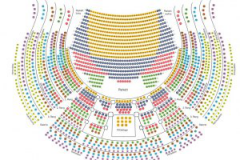Onegin-Munich Opera Festival
Mo | Tu | We | Th | Fr | Sa | Su |
"If any full-length ballet from the second half of the 20th century has the chance of becoming a classic à la Swan Lake, then that must, by reason of its unanimous appraisal and appreciation by audiences, dancers and critics, be John Cranko's Onegin."
Thus began one of the entries written for the Onegin-programme in Munich. Created in 1965, the story of Tatjana, a young woman who falls in love with the arrogant dandy Onegin only to be cruelly rejected by him, has captured a worldwide audience from Beijing to New York. After almost 45 years in the repertoire of the Bavarian State Ballet, the hypothetical claim as cited above has long since become evident fact. Onegin is a classic on a par with Swan Lake, and neither audiences nor dancers can ever tire of this choreography. No great ballerina would pass up the opportunity to dance the lead female persona which, like no other role in classical ballet, allows its interpreter to demonstrate the development from an innocent teenager to a mature adult who must decide between desire and duty in a highly dramatic conflict.
Act I, Scene 1 – Madame Larina’s Garden. Madame Larina, Olga, and the nurse are finishing off the party dresses and gossiping about Tatiana’s coming birthday festivities. Madame Larina speculates on the future and reminisces about her own lost beauty and youth. Girls from the neighbourhood arrive, their greetings and chatter are interrupted by gunshots.
Lensky, a young poet engaged to Olga, arrives and tells them there is no cause for alarm, he was hunting with a fried from St. Petersburg. He introduces Onegin, who, bored with the city, has come to see if the country can offer him any distraction. Tatiana, full of youthful and romantic fantasies, falls in love with the elegant stranger, so different from the country people she knows. Onegin, on the other hand, sees only a coltish country girl who reads too many romantic novels.
Scene 2 – Tatiana’s Bedroom Tatiana, her imagination aflame with impetuous first – love dreams of Onegin, writes him a passionate4 love – letter which she gives the nurse to deliver.
Act II, Scene 1 – Tatiana’s Birthday The provincial gentry have come to celebrate Tatiana’s birthday. They gossip about Lensky’s infatuation with Olga, and whisper prophecies of a dawning romance between Tatiana and the newcomer. Onegin finds the company boring. Stifling his yawns, he finds it difficult to be civil to them; furthermore he is irritated by Tatiana’s letter which he regards merely as an outburst of adolescent love. In a quiet moment, he tears up her letter. Tatiana’s distress, instead of awaking pity merely increases his irritation.
Prince Gremin, a distant relation, appears. He is in love with Tatiana, and Madame Larina hopes for a brilliant match; But Tatiana troubled with her own heart, hardly notices her kindly and elderly relation.
Onegin, in his boredom, decides to provoke Lensky by flirting with Olga who lightheadedly joins in the teasing. But Lensky takes the matter with passionate seriousness. He challenges Onegin to a duel.
Scene 2 – The Duel Tatiana and Olga try to reason with Lensky, but his high romantic ideals are shattered by the betrayal of his friend and fickleness of his fried beloved; he insists that the duel take place. Onegin kills his fried and for the first time his cold heart is moved by the horror of his deed. Tatiana realized that her love was an illusion, and that Onegin is self – centered and empty.
Act III, Scene 1 – St. Petersburg. Years later, Onegin having travelled the world in an attempt to escape from his own futility returns to St. Petersburg where he is received at a ball in the place of Prince Gremin. Gremin has recently married, and Onegin is astonished to recognize in the stately and elegant young princess, Tatiana, the uninteresting little country girl whom he once turned away. The enormity of his mistake and loss engulfs him. His life now seems even more aimless and empty.
Scene 2 – Tatiana’s Boudoir.Tatiana reads a letter from Onegin which reveals his love. Suddenly he stands before her impatient to know her answer. Tatiana sorrowfully tells him that although she still feels her passionate girlhood love for him, she is now a woman, and she could never find happiness or respect with him. She orders him to leave her forever.
Program and cast
Duration est. 2 hours 30 minutes
Conductor: Myron Romanul
Choreography: John Cranko
Set Design: Jürgen Rose
Tatjana: Maria Baranova
Onegin: Jinhao Zhang
Olga: Bianca Teixeira
Onegin's friend: Yonah Acosta
Count Gremin: Robin Strona
Madama Larina: Séverine Ferrolier
Amme: Elaine Underwood
Ensemble of the Bayerisches Staatsballett
Bayerisches Staatsorchester
National Theatre Munich
The National Theatre Munich (German: Nationaltheater München) is an opera house in Max-Joseph-Platz in Munich, Germany. It is the home of the Bavarian State Opera and the Bayerisches Staatsballett(Bavarian State Ballet).
The Bavarian State Opera also performs in the Prinzregententheater, which opened in 1901 and, like the Bayreuth Festspielhaus, is built to Richard Wagner's specifications, and in the Cuvilliés Theatre at the Residenz, constructed in 1751–1753 and described by Thierry Beauvert as "a Rococo gem".
The Nationaltheater is very easy to get to both by car and by MVV public transportation.
By MVV public transportation
S-Bahn: S 1 - 8 Marienplatz
U-Bahn: U 3, 6 Marienplatz, U 3 - 6 Odeonsplatz
Bus: 52, 131 Marienplatz, 100 Odeonsplatz
Straßenbahn: 19 Nationaltheater
On the day of the performance, holders of regular tickets are entitled to use public transport provided by the Münchner Verkehrsverbund (MVV). This service starts at 3 pm respectively three hours before the performance commences and ends with the closing hour of the MVV.
By Car
Take the Altstadt-Ring to Maximilianstraße.
Parking garage Max-Joseph-Platz: open Monday to Sunday from 6:00 A.M. to 2:00 A.M.
You can take advantage of the special theatre parking fee of Euro 10,- from 6:00 P.M. to 8:00 A.M. by presenting your admission tickets.

 EN
EN DE
DE IT
IT FR
FR ES
ES RU
RU JP
JP RO
RO
 Seating plan
Seating plan 